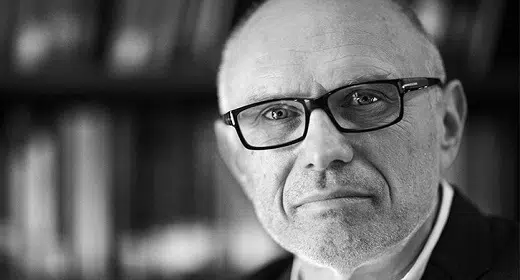by Vincent Williams: Miroslav Volf’s newest book is a self-styled “manifesto” for theology in the contemporary world…
The publication of For the Life of the World: Theology that Makes a Difference (public library) was the capstone to a multi-year project at the Yale Center for Faith and Culture (which Volf directs) aimed at studying the intersection between “the good life” and Christian theology. I had the great pleasure to take a course with Volf in my first semester at Yale Divinity School called “Christ and the Good Life.” I was amazed everyday at Volf’s ability to weigh our readings, let students guide our discussions, and wrap up our meetings with a few final sentences that somehow always tied up every loose thread from the day. When Miroslav Volf talks about the purpose of theology, I listen. You should too.
Theology has evolved substantially since the term first gained use in the Greek. Of course, we can’t know what human cultures believed and thought about the divine prior to the proliferation of written languages, but we know that theology, in its most basic sense, has been a defining feature of human thought since that beginning. What is theology for? We might think of primitive examples, such as helping to honor gods by prescribing specific practices and rituals. We might think, in other terms, that theology helps human beings make sense of their existence. One would find both of these features in many of the world’s historical religions.
What about today? In North American Christianity, “theology” is largely relegated to the academic work done by professionally-trained PhD’s in research universities or seminaries. Indeed, if you were to ask what qualified someone as a theologian, many would say being a theologian requires a PhD in theology. Fortunately, that definition couldn’t be further removed from how most Christians throughout church history understood theology and Christians’ role in thinking about God. At it’s most foundational level, theology is something that everyone does to one degree or another. We’re are always making judgments about ultimate values, what God is like, and what our purpose on earth might be.
Volf wants to take all of these disparate ideas of “theology” and re-define them toward one chief purpose. One of the major crises of religion around the world, for Volf, is that religions have lost a sense of what theology should be about. Shifting attitudes toward theology have led many people to think religion as a whole is entirely irrelevant to their lives.
There’s no use further delaying the inevitable. Here’s how Volf defines theology’s task:
“We believe the purpose of theology is to discern, articulate, and commend visions of flourishing life in light of God’s self-revelation in Jesus Christ. The flourishing of human beings and all God’s creatures in the presence of God is God’s foremost concern for creation and should therefore be the central purpose of theology.”
Consider the logic there. Volf argues that God’s purpose in creation is the flourishing of all creatures (Thomas Aquinas would concur, as he too matched up our greatest good with how God created us). From that standpoint, theology’s purpose is articulating visions of flourishing life. To describe flourishing life, theologians must commend understandings of what makes something valuable, worth desiring, etc., and all in light of Jesus Christ (for Christians).
“By ‘flourishing life’ we mean the good toward which humans are meant to strive. It names not so much any number of things we desire, but the ultimate goal of our striving along with the values that determine what is truly worth desiring.”
For Volf, this essential purpose of theology is well-attested in the basic nature of the world’s main religions.
“Each [religion] in its own way distinguishes between mundane and transcendent realms, and each in its own way claims that the ultimate human good consists in alignment of self (and, for some traditions, the world) with the transcendent order. At the heart of the great world religions lies an answer to the question of the true life, the good life, the genuinely flourishing life. World religions provide the most enduring, most widespread, and, arguably, still most potent visions of human flourishing.”
To help articulate what it means to flourish, Volf and his collegues at the Yale Center for Faith and Culture devised a tripartite structure of life that, taken together, offers anyone a framework to view the whole of life. The three dimensions are not meant to constrain reflection on the life worth living; rather, they can help guide any of us into thinking through how different cultural or religious ideas might impact different facets of life. The three are: Agential (life led well – i.e. “good conduct in life, from right thoughts of the heart to right acts.”), Circumstantial (life going well – i.e. “the desirable circumstances of life—be they natural, social, or personal”), and Affective (life feeling as it should – i.e. “states of happiness and empathy”).
So, to further define what Volf means by a vision of the good life:
“a set of explicit or implicit convictions about what it means for us to lead life well, for our life to go well, and for it to feel right, convictions that guide—or should guide—all our desires and efforts.”
With this definition, see how all sorts of things might contain one or another vision of the good life. Consider the general nature of consumerism. Consumerism as a “theology,” if you will, has its own picture of how one should act in life, what they should have and be surrounded with, and how they should feel. Advertising, brands, and cultural messages all coalesce to educate us in this version of the flourishing life. While that’s just a single example, the general framework Volf provides allows you to analyze nearly anything. Just ask those pointed questions: what does this want me to do? to feel? to have? Answer those questions and you’ll have an outline of an option for the good life. Analyzing different cultural ideologies is a key component of faithful Christian-living in society.
How you choose to live your life is the most important and lasting choice you’ll ever make.
“We are deciding what kind of human being it is worth being and what kind of world it is worth inhabiting.”
Unfortunately, much of modern Christianity has co-opted the “means” of the flourishing life for the “ends.” A quick look at self-help culture can illustrate: consider all of the books you might find in a self-help section at the local bookshop. They’re all on topics ranging from how to be a good parent, how to be successful in your career, how to make money, how to get into shape, how to get into the best schools, etc. While many of things are undoubtedly good, and Christianity would have no qualms with many of these, look closely at what they’re offering.
They’re offering you resources to win an already-defined game. They’re all designed to help you succeed at the rat race of life, to acquire and achieve things that our culture already defines as valuable. In other words, most self-help merely aids your actions to achieve pre-determined dreams—dreams which often starkly contrast with the visions of flourishing life found in the world’s great religious traditions. Rarely would you find a self-help book about how to choose a life worth living, or about what it truly valuable in life. Many sermons function in the same way. Preachers often try to use resources from the Christian tradition to help parishioners live the life already defined as good by our culture.
“It is increasingly common to employ the Christian faith primarily as a set of ‘skills’ and resources to manage a life whose course is preset by the demands of success in education and work and by cultural habits formed around leisure and entertainment.”
Quoting the sociologist Harmut Rosa, Volf notes that
“In a way, we moderns resemble a painter who is forever concerned about improving his materials—the colors and brushes, the air condition and lighting, the canvas and easel, etc.—but never really starts to paint.”
Here’s where Volf’s argument about the purpose of theology comes in handy. Theology should offer people a Christian-inflected account of the good life, the flourishing life, the life worth living.
“Today theology has an indispensable contribution to make in countering taste-driven, individualized, unreflective ways of living and helping people articulate, embrace, and pursue a compelling vision of flourishing life for themselves and all creation.”
This task—that of reflecting on the type of life that’s worth living—is one Augustine would have been very familiar with. He counseled his parishioners to think through how to align the “ends” of the Christian life with the “means” available to them. Reflecting at this level is difficult, however. To do it, we have to create enough critical distance between ourselves and the culture we inhabit in order to strategize about what it is we truly want to retain or resist. Henry David Thoreau provided a masterclass on this key skill in his memoir, Walden.
Whether you’re a lay person, pastor, or just someone interested in theology, I believe, alongside Volf, that it is crucial that we direct more of our efforts into articulating what is so worthwhile about Jesus’ vision of flourishing life. What is it that makes his ideas worth pursuing? How does the vision of life Jesus offered match up with what we were created to be and do? If we take our task as articulaters of the true life seriously, we have the potential to reach an entire generation increasingly fed up with the vacuous life much of our culture commends as worthwhile. This is what makes Volf’s For the Life of the World so valuable. After all, the shape of flourishing life is quite simple (in theory!): learn to match your desires and actions with how God created you to be.





















































